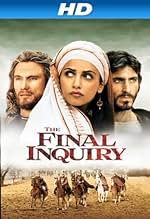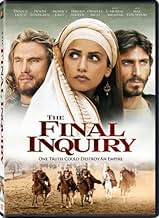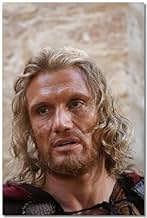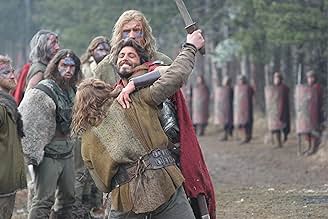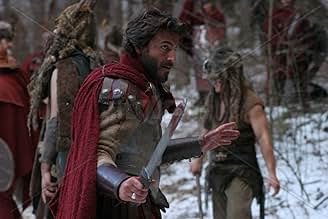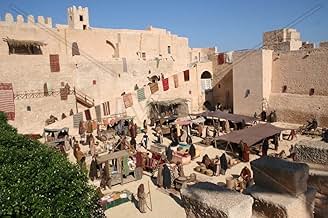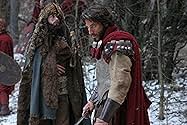CALIFICACIÓN DE IMDb
5.2/10
1.5 k
TU CALIFICACIÓN
En el año 35, un tribuno romano es enviado a Palestina para investigar la muerte y posible resurrección de un tal Jesús de Nazaret.En el año 35, un tribuno romano es enviado a Palestina para investigar la muerte y posible resurrección de un tal Jesús de Nazaret.En el año 35, un tribuno romano es enviado a Palestina para investigar la muerte y posible resurrección de un tal Jesús de Nazaret.
- Dirección
- Guionistas
- Elenco
- Premios
- 2 premios ganados en total
Opiniones destacadas
In 35 A.D. , an overconfident Roman tribune named Tito Valerio (Daniel Liotti) is sent to a remote part of the empire called Palestine to on a bizarre investigation to discover the death and possible resurrection of a certain Jesus from Nazareth , only to attract the suspicion of the local governor Pontius Pilate (Shopov) . This is the thrilling tale of one man's quest accompanied by a hunk barbarian slave (Dolph Lundgren) to uncover the mystery of all mysteries and while an official cover-up is presumed . A Roman agent is sent by emperor Tiberio (Max Von Sydow) to Palestine to investigate rumors of the resurrection of an executed criminal . Sent to disprove the resurrection and on a spiritual quest , he discovers faith , love (to Monica Cruz who looks exactly like Penelope as physical as acting) and a revelation that could shatter the empire . The tribune is taken prisoner and submitted a set-up .
Interesting story treating the resurrection of Jesus Christ with intrigue , suspense , a love story and adding historical events . As appears several historic characters as Tiberius , Caligula , Pontius Pilate , Apostle Peter finely performed by Enrico Lo Verso , Saulus of Tarsus well played by Fernando Guillen Cuervo , Maria mother of Jesus and Maria Magdalena in a brief acting by Ornella Muti . I found the film's motif a timeless subject , engaging and handled very skillfully too . Being conceived as both a theatrical film and a TV movie and treatment by the famous author of best-sellers about ancient world named Valerio Manfredini . The story from Suso Cecchi D'Amico and Ennio Flaiano even had an exclusive one-week theatrical engagement in Dallas , Texas . It's an acceptable treatment of the political and religious thought-world of the time , convincingly developed and the intent of the filmmakers is ultimately both ambitious and entertaining . The biggest weakness of the movie is the acting . Daniel Liotti as hard-nosed investigator and Dolph Lundgren as bouncing illiterate both deliver some stiff line-readings . But Liotti ultimately rises to the occasion , especially in the crucial last half-hour . Max Von Sidow is a credible emperor Tiberio who sends Daniel Liotti off on a dangerous mission . The picture has a Christian point of view that holds interest , while the former adaptation had offbeat and ambiguous resolution . The production was supported of a 500,000 Euros grant from the European Council fund Eurimages . It's an European co-production among various countries but specially Italy and Spain by producer Enrique Cerezo . Atmospheric musical score by Andrea Morricone in similar style to her father Ennio . Colorful and evocative cinematography by Giovanni Galasso , the filming took place for eight weeks in Tunisia and one week in Bulgaria . The motion picture is professionally directed by Giulio Base . Giulio is an expert on Television religious biopics and Roman spectacles such as he has proved in ¨Padre Pio¨ , ¨Maria Goretti¨ , ¨San Pietro¨ , ¨Pompeii¨ and of course , ¨The final inquiry¨ .
The original version titled ¨Inquire¨ (1987) treated the Resurrection as a mystery thriller , directed by Damiano Damiani was starred by Keith Carradine as Tito Valerio and Harvey Keitel as Pontius Pilate and Phyllis Logan as Claudia Procula who in the recent rendition is performed by Anna Kanakis . This 1987 picture was engaging , thought-provoking , violent and gritty but but sadly was ultimately rather flat and dull and had box office flop , however this new retelling (2006) is more commercial , more amusing and aimed for all kind of public as teens as adults .
Interesting story treating the resurrection of Jesus Christ with intrigue , suspense , a love story and adding historical events . As appears several historic characters as Tiberius , Caligula , Pontius Pilate , Apostle Peter finely performed by Enrico Lo Verso , Saulus of Tarsus well played by Fernando Guillen Cuervo , Maria mother of Jesus and Maria Magdalena in a brief acting by Ornella Muti . I found the film's motif a timeless subject , engaging and handled very skillfully too . Being conceived as both a theatrical film and a TV movie and treatment by the famous author of best-sellers about ancient world named Valerio Manfredini . The story from Suso Cecchi D'Amico and Ennio Flaiano even had an exclusive one-week theatrical engagement in Dallas , Texas . It's an acceptable treatment of the political and religious thought-world of the time , convincingly developed and the intent of the filmmakers is ultimately both ambitious and entertaining . The biggest weakness of the movie is the acting . Daniel Liotti as hard-nosed investigator and Dolph Lundgren as bouncing illiterate both deliver some stiff line-readings . But Liotti ultimately rises to the occasion , especially in the crucial last half-hour . Max Von Sidow is a credible emperor Tiberio who sends Daniel Liotti off on a dangerous mission . The picture has a Christian point of view that holds interest , while the former adaptation had offbeat and ambiguous resolution . The production was supported of a 500,000 Euros grant from the European Council fund Eurimages . It's an European co-production among various countries but specially Italy and Spain by producer Enrique Cerezo . Atmospheric musical score by Andrea Morricone in similar style to her father Ennio . Colorful and evocative cinematography by Giovanni Galasso , the filming took place for eight weeks in Tunisia and one week in Bulgaria . The motion picture is professionally directed by Giulio Base . Giulio is an expert on Television religious biopics and Roman spectacles such as he has proved in ¨Padre Pio¨ , ¨Maria Goretti¨ , ¨San Pietro¨ , ¨Pompeii¨ and of course , ¨The final inquiry¨ .
The original version titled ¨Inquire¨ (1987) treated the Resurrection as a mystery thriller , directed by Damiano Damiani was starred by Keith Carradine as Tito Valerio and Harvey Keitel as Pontius Pilate and Phyllis Logan as Claudia Procula who in the recent rendition is performed by Anna Kanakis . This 1987 picture was engaging , thought-provoking , violent and gritty but but sadly was ultimately rather flat and dull and had box office flop , however this new retelling (2006) is more commercial , more amusing and aimed for all kind of public as teens as adults .
When I got this movie it had quite a low score here on IMDb. But the subject seemed to be interesting, it was not an Hollywood production and had at least one big name in the paylist - Max von Sydow's. So I took the challenge and gave it a try. Big mistake... Though it's screenplay is written with some interesting plots and with quite an original ideas for a Jesus-related movie this is almost the only thing worth to be praised here.
The first thing you will notice is the music of someone, who's surname is Moricone but his not "the one" but some other Moricone. So is his music - kind of Moricone's style but not "the one" - something is missing, it's to loud and generally does not fit.
Then you will notice the performers and they certainly can help to forget about poor music since they performance is really stunning. Literatim. It's something like operetta filmed in the silent movie period with all those exalted movement and acting typical for those old times. Moreover my version was apparently dubbed in English although the movie was apparently made in English at the first place! I do not know why they did it - maybe some Italian actors had some problems with the language but then if you add voices to a already finished movie it is never perfect and the effect is rather ridiculous. Combined with aforementioned style of acting it looks just utterly stupid. And if this was not enough some of supporting roles are seemed to be written for computer RPG characters! You know, like for example those typical NPCs standing next to the town gates only to say something like "welcome to Jerusalem"... Some dialogues between those characters seemed o be intentionally written in Monthy Python style...
But apart from that there is also an actor there who really stands out - Dolph Lundgren! By far it is the best of his performance I had a "pleasure" to watch. Of course as every barbarian he speaks with Scottish accent witch is really sweet, especially that he apparently is trying to imitate Sean Connory... Since he plays a barbaric Germanic warrior and he has not much to do there apart from being "strong, noble and wild" and of course of swinging his enormous axe everywhere. The movie is full of scenes where Lundgren is shown somewhere in the background or foreground performing this complicated tasks and I must admit he had really mastered it. Seriously - for someone who's performing talent is so, well, narrow I think he is a real star in this movie.
Some say "there is no good movie without a love story plot". But this one could be definitely better without. I had mentioned before about some interesting and original ideas in the scenario but this is only to be observed in the first half of the movie. The second half is devoted mainly to love story plot and this just kills this otherwise would-be-weak-but-not-the-worst movie. It's just dull and absurd in the world of this picture and moreover it is completely redundant.
See for yourself if you dare but there are better ways of spending time.
The first thing you will notice is the music of someone, who's surname is Moricone but his not "the one" but some other Moricone. So is his music - kind of Moricone's style but not "the one" - something is missing, it's to loud and generally does not fit.
Then you will notice the performers and they certainly can help to forget about poor music since they performance is really stunning. Literatim. It's something like operetta filmed in the silent movie period with all those exalted movement and acting typical for those old times. Moreover my version was apparently dubbed in English although the movie was apparently made in English at the first place! I do not know why they did it - maybe some Italian actors had some problems with the language but then if you add voices to a already finished movie it is never perfect and the effect is rather ridiculous. Combined with aforementioned style of acting it looks just utterly stupid. And if this was not enough some of supporting roles are seemed to be written for computer RPG characters! You know, like for example those typical NPCs standing next to the town gates only to say something like "welcome to Jerusalem"... Some dialogues between those characters seemed o be intentionally written in Monthy Python style...
But apart from that there is also an actor there who really stands out - Dolph Lundgren! By far it is the best of his performance I had a "pleasure" to watch. Of course as every barbarian he speaks with Scottish accent witch is really sweet, especially that he apparently is trying to imitate Sean Connory... Since he plays a barbaric Germanic warrior and he has not much to do there apart from being "strong, noble and wild" and of course of swinging his enormous axe everywhere. The movie is full of scenes where Lundgren is shown somewhere in the background or foreground performing this complicated tasks and I must admit he had really mastered it. Seriously - for someone who's performing talent is so, well, narrow I think he is a real star in this movie.
Some say "there is no good movie without a love story plot". But this one could be definitely better without. I had mentioned before about some interesting and original ideas in the scenario but this is only to be observed in the first half of the movie. The second half is devoted mainly to love story plot and this just kills this otherwise would-be-weak-but-not-the-worst movie. It's just dull and absurd in the world of this picture and moreover it is completely redundant.
See for yourself if you dare but there are better ways of spending time.
a Biblical film. not great ambitions, few nice fight scene, basic line, a cast with exercise in this type of drama ( Hristo Shopov - new / old Pontius Pilat, Hristo Jivkov - ex - John in Passion of Crist, now Stefan ), Dolph Lundgren in skin of different kind of role, Max van Sydow, Enrico Lo Verso , F. Murray Abraham as solid pillars , Ornela Mutti like drop of scent and beautiful Monica Cruz - alter -ego of her sister and basic attraction of a movie who is not Quo Vadis, not Jesus of Nazareth but little exercise to recreate atmosphere of Church beginnings. so, it is just an exercise. not spectacular, not interesting, almost boring and predictable but decent at first sigh. crumbs of history - legend about Tiberius death -, pieces of innovation - the decree about Chistianity freedom -, authentic miracle of come back to life of Tabitha and the end - mixture of dust and faith. a drawing like so many others.
First, I was unaware that this was a re-make. If the first movie is on DVD, I'll try it to see any difference. As to this movie (2006), I am going to write my usual bug-aboo about historical accuracy and the movies.
I wish just once that a film set in the period of Yeshua/Jesus would depict the Jewish people with a less than jaundiced - read: historically inaccurate - eye. I was confronted at the very opening of this film with yet another scene of "crazed Jews" stoning a woman for adultery. According to some extensive research on this period, I have learned that the imposition of the death penalty in ancient Jewish society was rare and could only be undertaken under very controlled conditions. For example, a woman caught in adultery was not automatically put to death. Both she and her husband had to appear before the Great Sanhedrin in Jerusalem - and only this body, with the consent of every single member, could actually pronounce the death sentence. One "no" vote and there was an acquittal. The husband could forgive his wife and take her back and that was the end of it. Or he could divorce her. If she was freed and committed adultery again, then the matter would be returned to the High Court. Trials took three days: testimony and evidence on the first day; deliberation by the court on the second, and the third day reserved for the verdict. This third day was meant as a "cooling off period" to avoid a rush to judgment. The sentence upon conviction was not always death. None of this "crazed outrage" in the streets followed by an angry stoning as depicted in this film. It is also said that any Sanhedrin that passed two death sentences within 7 years was called a "bloody Sanhedrin." In other words, the Jewish people had made a deliberate attempt to provide justice in an orderly and civilized way. To depict them as simply a bunch of "crazies" running about the streets like blood-crazed savages is nothing more than pure propaganda.
One other note on the trial, each member of the court had a small pebble - a stone - that they tossed (cast) into a large pot. The stones were then counted to reach a verdict. This is what is meant by the phrase: "Let those among you who are blameless (without malice; pure of heart) cast the first stone."
Further, no Sanhedrin would meet to hold a "trial" - especially one involving a potential death sentence - within three days BEFORE and three days AFTER a religious holiday. This is because of the three-day trial concept. Therefore, Jesus couldn't be tried and convicted on the same day.
As far as this movie is concerned, it is a standard Christian story told with some reverence for the faith, although it is not entirely original in it's story line. Compare it with "The Robe" (1953) where a Roman soldier (Richard Burton) is sent by the Emperor Tiberias to find the "true" story of what happened in Jerusalem. That Roman is cynical at first but, through the miracle of Peter saving a young woman (played then by Debra Paget), the soldier converts to Christianity.
I wish just once that a film set in the period of Yeshua/Jesus would depict the Jewish people with a less than jaundiced - read: historically inaccurate - eye. I was confronted at the very opening of this film with yet another scene of "crazed Jews" stoning a woman for adultery. According to some extensive research on this period, I have learned that the imposition of the death penalty in ancient Jewish society was rare and could only be undertaken under very controlled conditions. For example, a woman caught in adultery was not automatically put to death. Both she and her husband had to appear before the Great Sanhedrin in Jerusalem - and only this body, with the consent of every single member, could actually pronounce the death sentence. One "no" vote and there was an acquittal. The husband could forgive his wife and take her back and that was the end of it. Or he could divorce her. If she was freed and committed adultery again, then the matter would be returned to the High Court. Trials took three days: testimony and evidence on the first day; deliberation by the court on the second, and the third day reserved for the verdict. This third day was meant as a "cooling off period" to avoid a rush to judgment. The sentence upon conviction was not always death. None of this "crazed outrage" in the streets followed by an angry stoning as depicted in this film. It is also said that any Sanhedrin that passed two death sentences within 7 years was called a "bloody Sanhedrin." In other words, the Jewish people had made a deliberate attempt to provide justice in an orderly and civilized way. To depict them as simply a bunch of "crazies" running about the streets like blood-crazed savages is nothing more than pure propaganda.
One other note on the trial, each member of the court had a small pebble - a stone - that they tossed (cast) into a large pot. The stones were then counted to reach a verdict. This is what is meant by the phrase: "Let those among you who are blameless (without malice; pure of heart) cast the first stone."
Further, no Sanhedrin would meet to hold a "trial" - especially one involving a potential death sentence - within three days BEFORE and three days AFTER a religious holiday. This is because of the three-day trial concept. Therefore, Jesus couldn't be tried and convicted on the same day.
As far as this movie is concerned, it is a standard Christian story told with some reverence for the faith, although it is not entirely original in it's story line. Compare it with "The Robe" (1953) where a Roman soldier (Richard Burton) is sent by the Emperor Tiberias to find the "true" story of what happened in Jerusalem. That Roman is cynical at first but, through the miracle of Peter saving a young woman (played then by Debra Paget), the soldier converts to Christianity.
The original movie, made in 1986 and starring Keith Carradine and Harvey Keitel, is a little-known gem of an intellectual thriller, with a plot that takes numerous unexpected twists.
This "remake" (hardly that, since the title, basic premise, and name of the lead character are all that remain) is essentially a Sunday school movie made by hacks, full of pious posturing. It's pretty to look at, but utterly lacking in suspense, narrative drive, good acting, or just about anything else you might desire in a movie.
I am beginning to think that any movie with Valerio Massimo Manfredi's name in the credits is going to be very, very bad.
This "remake" (hardly that, since the title, basic premise, and name of the lead character are all that remain) is essentially a Sunday school movie made by hacks, full of pious posturing. It's pretty to look at, but utterly lacking in suspense, narrative drive, good acting, or just about anything else you might desire in a movie.
I am beginning to think that any movie with Valerio Massimo Manfredi's name in the credits is going to be very, very bad.
¿Sabías que…?
- TriviaWas conceived as both a theatrical film and a TV movie.
- ErroresIn the early scene in which Tito Valerio Tauro leaves Tiberius on the isle of Capri, the film is being run backwards because the fire and smoke on the upper right of the scene is going into the fire, not up and away from it .
- Versiones alternativasThere are two versions of the film, a theatrical one (112') and a TV one in two parts (190' - 95' each). The extended version premiered on Italian and is available on the Czech DVD edition. The TV version is highly recommended due to its complete script with a larger cast of relevant characters, which increases plot weight and eases the story understanding. Apart of some characters, a few secondary outlines appear despite of the cinema version. Sometimes, the short version seems to be cut off, but some viewer's questions may be shown are fully solved in the most amusing TV version.
- ConexionesFeatured in Making of 'The Inquiry' (2007)
Selecciones populares
Inicia sesión para calificar y agrega a la lista de videos para obtener recomendaciones personalizadas
- How long is The Final Inquiry?Con tecnología de Alexa
Detalles
- Fecha de lanzamiento
- Países de origen
- Sitio oficial
- Idiomas
- También se conoce como
- The Final Inquiry
- Locaciones de filmación
- Bulgaria(opening)
- Productoras
- Ver más créditos de la compañía en IMDbPro
Taquilla
- Presupuesto
- EUR 8,000,000 (estimado)
- Total a nivel mundial
- USD 249,610
- Tiempo de ejecución1 hora 52 minutos
- Color
- Mezcla de sonido
- Relación de aspecto
- 1.85 : 1
Contribuir a esta página
Sugiere una edición o agrega el contenido que falta

Principales brechas de datos
By what name was L'inchiesta (2006) officially released in Canada in English?
Responda

